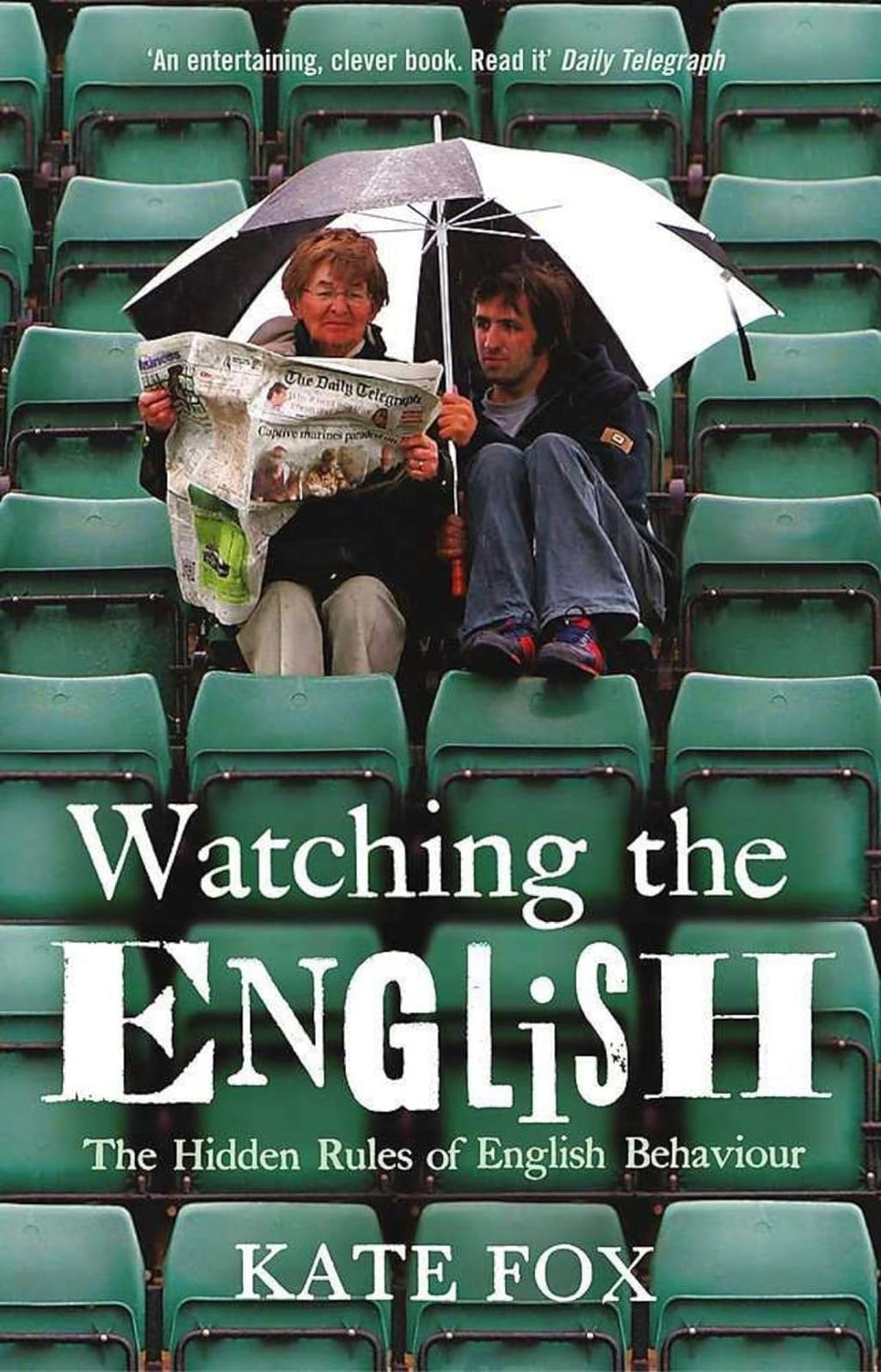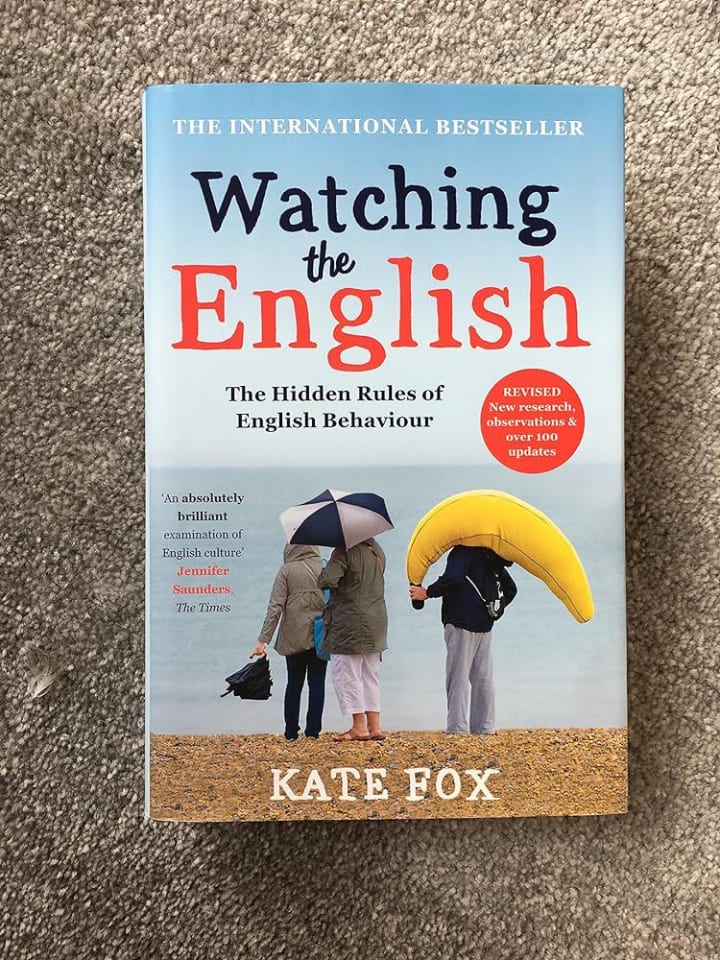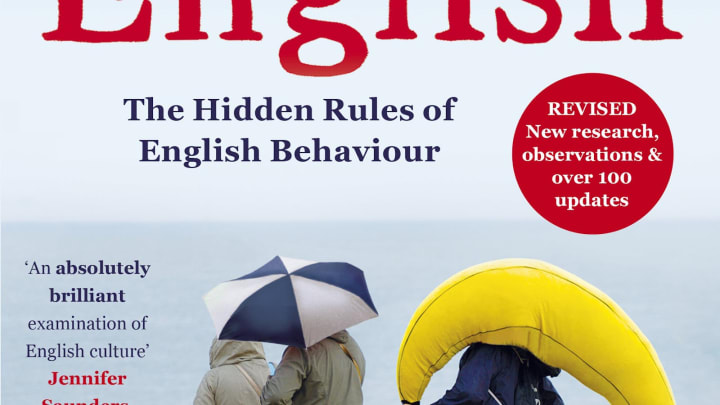Book Review: "Watching the English" by Kate Fox
4/5 - a funny, brilliant analysis of English principles...

“Tea is still believed, by English people of all classes, to have miraculous properties. A cup of tea can cure, or at least significantly alleviate, almost all minor physical ailments and indispositions, from a headache to a scraped knee. Tea is also an essential remedy for all social and psychological ills, from a bruised ego to the trauma of a divorce or bereavement. This magical drink can be used equally effectively as a sedative or stimulant, to calm and soothe or to revive and invigorate. Whatever your mental or physical state, what you need is ‘a nice cup of tea’.”
- Watching the English by Kate Fox
I have to say that my list of books that I have gathered from my reading of the nonfiction social inequality text The Inner Level is wild. One of them may have been No Logo by Naomi Klein and another is this, Watching the English by Kate Fox. At the moment, I am enjoying reading books about social sciences and political philosophy possibly more than I have at any other time in my life. I feel that my brain is being loaded with so much information - but it is also not pushing out any escapist fantasies explored in great works of fiction. Two things can be true at the same time and I thank the lord for my modestly-higher-than-average IQ for allowing me to do this without anything hurting or being forgotten in the process. A humble brag, from a humble English person.
Anthropologist Kate Fox is the daughter of the legendary Robin Fox and begins her book Watching the English with a sentiment about the everlasting timelessness of English politeness. These can include simple things about saying ‘sorry’ when you bump into someone or saying ‘please’ at the end of every short sentence when asking for something.

Those that are empty precursors instead of asking the question have always been some of my personal favourites: ‘sorry to bother you but could I…’ and ‘If it’s alright, could I possibly…’, ‘If it’s not too much trouble could I possibly…’ and ‘Sorry to disturb you but is there any way that I could…’ are just some examples of this happening. And we as the English do not ask why we do this, but mostly we are the only ones who do it. I have to say to a non-native onlooker it must look very strange.
Kate Fox also argues that no amount of catastrophe in the world has changed that so far and many of our unwritten politeness policies have remained the same. In a statement regarding the revision of her book, she sees that not a lot has changed in what we do, but she instead chose to carry out social experiments and field research to make her book seem more anthropological.
This is something I studied a long time ago when I was doing my A-Levels. In English Language the English definitely have politeness maxims, things they say in order to remain polite. Something that hearkens back to 'polite society' and the view of the upper class as more 'polite'. This want to be regarded as 'better' or more 'upper class' has had a weird trickle down effect to our own day and now, we don't know why we do it. Polite society has all but disappeared as a concept of class, but the language still remains. It is something that greatly interests me and I'm glad I found this book.
Her comments about not being accepted among some academics whilst also being accepted amongst others is a clever weaving of this same sentiment and snobbery culture she is analysing. Whilst we harbour sentiments, we can also harbour snobbery. I am guilty of this when it comes to modern art - it is a polite snobbery though I admit. Whilst I am laughing about her story of bursting into the academic world because her tone is just hilarious, I am also becoming acutely more aware of my own behaviours and how quintessentially ‘politely English’ they are.

There is a point of ethnic minorities as English. I, myself, am an ethnic minority. As a second generation Indian, I find myself in the same predicament suggested in Kate Fox's book. I adopt the best parts of both cultures in order to serve my own interests. Though, I have quite a posh English voice and a hankering for Fortnum and Mason teas, I find myself also enjoying the foods and festivals of my mother's home. Yes, it is true but I also find myself associating more with the culture of the English than the Indian. I'm sorry about that but I was just raised this way. Apart from the food, bits of language acquisition and ancestry, I have essentially nothing in common with the Indians of the Indian Republic.
This holds on to the fact that Kate Fox states that one of the friends in her group that she regards as the most quintessentially English is a woman of Indian descent - and a first generation. Surprising yes, but I wage you to be able to tell whether my mother is first or fifteenth generation for how English she speaks and acts, whilst being fluently able to retain everything Indian about herself. It's quite an analysis to make for Fox and I wholly agree with her as an ethnic minority. Though I also agree that culture has nothing to do with skin colour.
Another one of the points I liked was quite early on in the book in which Fox describes how English people talk about the weather, going through how it is primarily there to gage the emotions of the other person and see whether they will talk to us. A more modern version of 'how do you do?', it has become the primary line of conversation in which people try to see what the emotions of others are and whether we will be friends with them. As the weather is a universal experience, it breaks the barriers of anything social obstacle that has been placed in the way.
I was surprised to learn that younger people tend to use the weather-talk more than older people. Kate Fox goes through the fact that younger people think that there is something about weather talk that, in perhaps the same style as a pathetic fallacy, can tell you how someone is feeling. But it is also probably because the young folks of today are more likely to feel some kind of social anxiety and weather-talk is known to break that down, that this is most likely the case.

Right now, I am sat in a pub, typing something up whilst a friend is in the bathroom and other friends are typing things up too. I am analysing the people around me and looking at how they interact. The Proclaimers play loudly in the background as two old men ask each other about how unpredictable the weather is and I wonder if they know each other or, if this is their first conversation. Musings this book makes me do are unbelievable. There is a woman and a man showing each other things on their phones, so they clearly know each other. I have been asked by the bartender about the weather whilst getting a coke to create conversation - a conversation he probably creates with a thousand other customers on a regular basis. I have never realised how much this happens before right at this moment. It is astounding.
This leads us into another point I enjoyed regarding pub-talk. Pub-talk is something so important in this book of Englishness 'codes' and I have found myself doing it more times than one or two. In fact, I do it every time I go to the pub. The first is the whole thing about English queueing. It is analysed in this book that the English queue for everything. Literally, everything. But, in the pub there is no queue. In fact, it is actually a queue but it is an invisible one. I have found myself queueing for the bus when there is only about four people plus myself there - but in the pub I just stand at the bar, waiting for my turn patiently with my phone in my hand, indicating that I would like to pay for something.
One story I found quite funny is when the author states that she would hole a stopwatch to see how long it would take foreigners to realise there was no table service at pubs. The lack of table service seems quitessential to provide light conversation (such as: weather talk) between bartender and customer. As I stated in my own experience, I find it wild how much is going on that I am actually experiencing.
I love the fact that she tells us about DIY. People who move into previously owned homes often to DIY in order to perform home ownership. Home improvement is that self-expression in which English people add thing to the house in order to make it their own. Apart from this being linked to the numerous vans selling tea and doughnuts, this practice is something of a strange thing.
However, I feel like her comments about houses and their decoration is rather outdated, especially considering there are numerous comments on the television. Not many people nowadays - especially those who live in apartments or studio apartments - even have a television let alone have a big flat screen or something else.

A point I think is rather important is the one about dress sense. Nothing has made me think about how I dress more than how Kate Fox states that it is always (even if we don't think it is) a status signal. If you are not aware, I wear blazer, a jumper, a pair of black trousers and often underneath, a t-shirt with some weirdness on it that I'm lucky nobody can see beneath the jumper. I look like a Marks and Spencers advert and I'm not ashamed to say so. According to Kate Fox, English people dress particularly badly and only dress well when we are given a uniform to wear. As someone who, as a privately educated woman, had to wear a cherry red uniform, I may not think this is true, but the status it reflects is often considered better than what I reflect now. Kate Fox has revealed me as a walking contradiction and I may not like it, but I like laughing at it. How very English!
From play, to pubs, from values to breaking the rules, from foreign confusion to social anxiety, from drinking to social discomfort - Kate Fox has covered almost every single facet of English life. I found this book rather funny and quite informative but I am also going to be on the look-out for how many times I use the word 'please' or 'sorry' during the day. It's going to be difficult but nearly impossible not to do after this experience.
About the Creator
Annie Kapur
200K+ Reads on Vocal.
English Lecturer
🎓Literature & Writing (B.A)
🎓Film & Writing (M.A)
🎓Secondary English Education (PgDipEd) (QTS)
📍Birmingham, UK






Comments (1)
A nice review. I would try!